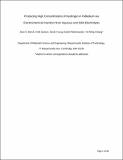Producing High Concentrations of Hydrogen in Palladium via Electrochemical Insertion from Aqueous and Solid Electrolytes
Author(s)
Benck, Jesse D; Jackson, Ariel; Young, David; Rettenwander, Daniel; Chiang, Yet-Ming
DownloadSubmitted version (2.412Mb)
Publisher Policy
Publisher Policy
Article is made available in accordance with the publisher's policy and may be subject to US copyright law. Please refer to the publisher's site for terms of use.
Terms of use
Metadata
Show full item recordAbstract
© 2019 American Chemical Society. Metal hydrides are critical materials in numerous technologies including hydrogen storage, gas separation, and electrocatalysis. Here, using Pd-H as a model metal hydride, we perform studies of electrochemical insertion of hydrogen into palladium via three different electrolyte media, aqueous liquid, polymeric solid, and ceramic solid electrolytes, from a gas phase source at 1 atm pressure. We show that the compositions achieved result from a dynamic balance between the rates of hydrogen insertion and evolution from the Pd lattice, the combined kinetics of which are sufficiently rapid that operando experiments are necessary to characterize the instantaneous PdHx composition. Therefore, we use simultaneous electrochemical insertion and X-ray diffraction measurements, combined with a new calibration of lattice parameter versus hydrogen concentration, to accurately quantify the PdHx composition. Furthermore, we show that the achievable hydrogen concentration is severely limited by electrochemomechanical damage to palladium and/or the substrate and that such damage is minimized by a combination of thin palladium films and compliant substrates. Under optimal conditions, we reach a maximum hydrogen concentration of x = 0.96 ± 0.02. The understanding embodied in these results helps to establish new design rules for achieving high hydrogen concentrations in metal hydrides.
Date issued
2019Department
Massachusetts Institute of Technology. Department of Materials Science and EngineeringJournal
Chemistry of Materials
Publisher
American Chemical Society (ACS)